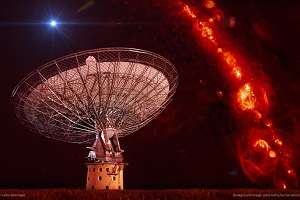Detected radio bursts evidence of 'exotic phenomena'

The detection of four short bursts of radio waves, possibly arising from explosions billions of light years away, could be powerful tools to study our Universe, according to research published in Science.
In 2006, a similar so called 'Lorimer burst' was detected with the CSIRO Parkes radio telescope and its authenticity was debated with widespread scepticism about its astrophysical origin.
Those doubts have been laid to rest with the recent discovery of four similar bursts, using the same radio telescope in research co-authored by Curtin University's Dr Ramesh Bhat.
"The only way to address such doubts about the Lorimer burst was to survey a large part of the sky, with new, more sensitive technology," Dr Bhat says.
An international team of researchers equipped the radio telescope with a digital recorder that can sample data at an extremely rapid rate, faster than one tenth of a millisecond.
It is then able to split the frequency range into more than 1000 fine segments. The previous recorder was four times slower, splitting the frequency into less than 100 segments.
"This means our survey is highly sensitive to short duration bursts from billions of light years away."
Four fast radio bursts (FRBs) were discovered, which last only a few milliseconds, from four widely spaced directions in the sky.
"[This discovery] confirms there are exotic explosive phenomena in our Universe. The energy released from such explosions is detected as these radio bursts," Dr Bhat says.
The team's analysis suggests that these bursts likely originate from billions of light years away, the furthest being almost 11 billion light years away.
"They have to be incredibly energetic explosions for us to be able to detect them, given their inferred large distances," Dr Bhat says.
"We do not know what exactly caused these bursts, though they likely originate from exotic phenomena, such as when a super massive neutron star collapses into a black hole."
Science is unable to explain these FRBs within the current known framework of physical phenomena.
"We hope our results will stimulate theorists to think of new physics to explain our observations."
Even more remarkable is the conclusion that thousands of these bursts may be striking Earth every day.
Dr Bhat says these FRBs could be incredibly powerful tools.
"They carry valuable information on how much [normal] matter they encounter as they make their way to the Earth and could potentially help us answer questions about the birth and evolution of the Universe."
More information: www.sciencemag.org/content/341/6141/53.abstract
Journal information: Science
Provided by Science Network WA




















